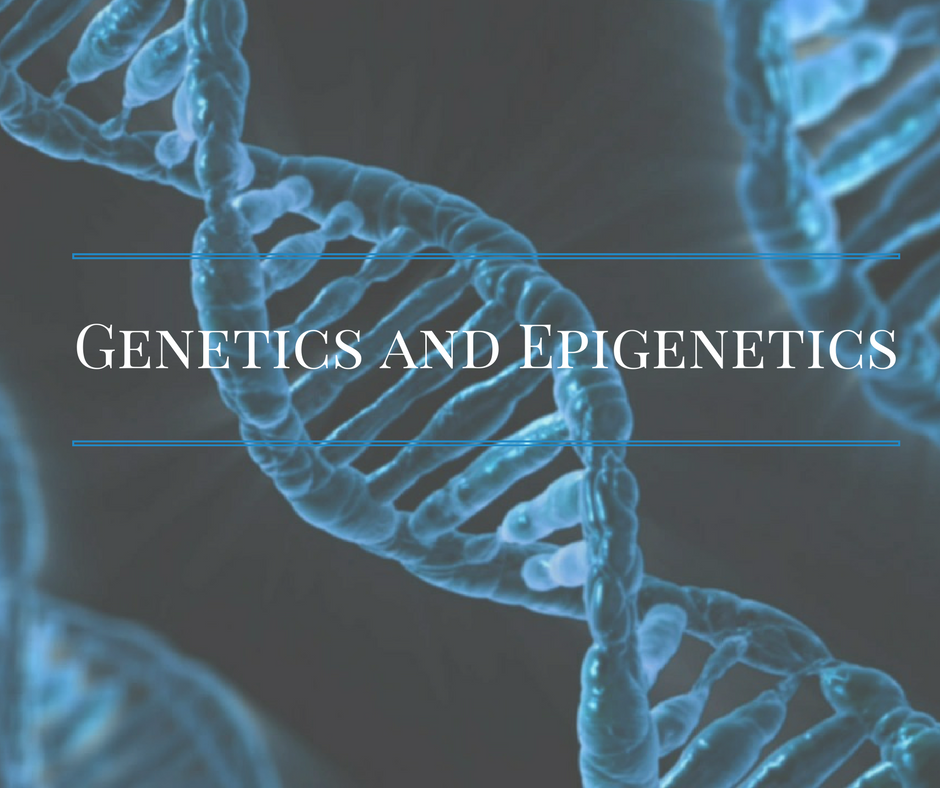Welcome to the second edition of my new series…Biology Basics!
These short tutorials will give you insights into the basic biology of processes fundamental to human health. Last month in part one I reviewed genetics. This month, in part two, I’m introducing epigenetics.
Part two – Epigenetics
Epigenetics simply refers to the mechanisms within your body that act upon your genes. Your epigenetics control how often and how much a particular gene is used. While you may have inherited certain genetic traits or disease risks, your epigenetics control whether or not (and when) those traits or disease risks are likely to appear. Epigenetics helps to explain why not everyone with a specific genetic risk develops the disease.
The study of epigenetic factors dates back 50+ years but only in the last 5-10 years have we gained a better understanding of just what they are and how they influence our health. Two key breakthroughs in our understanding came when researchers discovered 1) epigenetics can be inherited and 2) epigenetics are influenced by lifestyle factors.
Epigenetic Inheritance
This was a very surprising breakthrough! Genes in the form of DNA were thought to be the only biology inherited from parents. Originally, an embryo was believed to have started life without the epigenetic factors of their ancestors. However, it’s now clear that these factors can be inherited along with the DNA. This means that the parents’ and even grandparents’ experiences that changed their epigenetics can be passed on to children and grandchildren.
Epigenetics are not mutations, changes to the DNA. They are factors that influence the genes and how and when they are used. This is, in part, why the idea of inheritance is so surprising. Mutations are changes in the DNA that make-up genes and are inherited. Epigenetic factors are not part of the DNA, and therefore, they would not be expected to be inherited. But, they are, from both the sperm and the egg.
The research suggests that epigenetics can be passed down anywhere from 4 to 14 generations! This is concerning because unlike your genes, your epigenetics are strongly influenced by your environment and lifestyle factors. What healthy or unhealthy behaviors your parents and grandparents or other ancestors engaged in could influence your health. Whoa!
Epigenetics, Disease, and Lifestyle
There is a strong link between epigenetics and disease, particularly obesity, aging, inflammation, and cancer. Many of the changes in epigenetics due to environmental exposure (e.g., toxins, pollutants) or lifestyle choices (e.g., smoking, nutrition, body weight) influence genes associated with diseases. And as you just learned, what you do to your epigenetic factors not only influences your health but the health of your children, your children’s children, your children’s children’s children…well, you get the idea.
Key influencers in regulating epigenetics include infection, pollutants, nutrition, and stress. All of these factors have been linked to increased inflammation and disease risks. Let’s take nutrition, a topic my readers are most interested in, and explore bit about how it can influence our disease risks through epigenetic modifications.
Nutrition plays a role through nutrients like vitamins and other bioactive compounds. Numerous nutrients have been linked to specific types of mechanisms that change how our genes are expressed. For example, a high-fat diet has been linked to the silencing of a weight-control gene in mice. In humans, another study demonstrated that a gene was altered in those with a higher BMI relative to those with lower values. Another example, folate deficiency, has been linked to changes associated with aging, autoimmunity, and cardiovascular disease.
The take-home message here is that nutrition has the power to both help and hurt us through the modulation of our genes.
Until next time, stay well!
Dr. Tobi Schmidt

